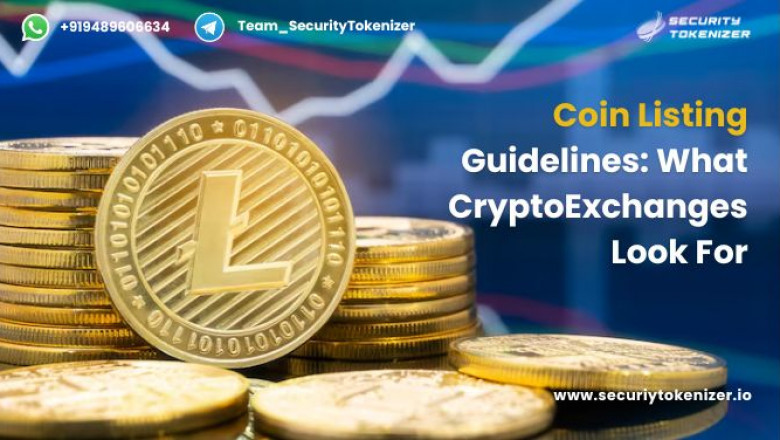views
In the ever-expanding world of cryptocurrencies, getting your coin or token listed on a crypto exchange is a major milestone. Whether it's a centralized exchange (CEX) like Binance or Coinbase, or a decentralized exchange (DEX) like Uniswap or PancakeSwap, listing increases visibility, liquidity, and accessibility for traders and investors. However, securing a coin listing service is not automatic, it requires meeting specific guidelines and criteria set by each platform.
In this article, we’ll explore the key coin listing guidelines that crypto exchanges typically evaluate when considering a new project, and how startups or blockchain developers can prepare for a successful coin listing.
Why Coin Listing Matters
Before diving into the listing criteria, it's important to understand why coin listing is crucial:
1. Increased Liquidity: Listed coins gain access to larger user bases and active markets.
2. Credibility Boost: Listing on reputable exchanges adds legitimacy to a project.
3. Exposure to Investors: Projects can attract more investors and partners once they’re listed.
4. Wider Adoption: With easier access, users are more likely to buy, trade, and use the coin.
Given these advantages, it’s clear why coin listing is a primary goal for most blockchain projects.
1. Strong Project Fundamentals
Crypto exchanges evaluate the core purpose and utility of the coin. Your project should offer real-world use cases, unique features, or innovations that stand out in the crowded crypto market.
Questions exchanges may ask include:
1. What problem does the coin solve?
2. Is there a working product or minimum viable product (MVP)?
3. What are the technical advantages of the coin over competitors?
Clearly defining your coin's value proposition is essential before even applying for listing.
2. Team Transparency and Experience
Exchanges conduct thorough due diligence on the project team. A skilled, experienced, and transparent team increases a project's chances of getting listed.
You should ensure:
1. Public profiles (LinkedIn, GitHub, etc.) for all core team members
2. Clear documentation of roles and contributions
3. Advisors with blockchain or financial experience
4. Anonymous or unverified teams raise red flags for many exchanges, especially centralized ones.
3. Legal Compliance and Regulatory Clarity
Crypto exchanges prioritize compliance with international and regional regulations. Any token aiming for listing must be free from legal ambiguity.
Key aspects include:
1. Clarity on whether the coin is a utility token or a security
2. Adherence to KYC (Know Your Customer) and AML (Anti-Money Laundering) policies
3. Proper legal structure, including incorporation and token sale documentation
Working with legal advisors during the coin development and fundraising phases can prevent issues later during listing.
4. Tokenomics and Supply Model
Tokenomics is one of the most critical factors in exchanges' review. Your coin must have a clear and sustainable economic model.
Essential components include:
1. Total token supply and distribution breakdown
2. Vesting schedules for the team and investors
3. Incentive mechanisms for users and holders
4. Inflation and deflation strategies
Exchanges want assurance that the token will retain long-term value and that no party can manipulate its price or supply unfairly.
5. Security and Smart Contract Audit
Before a coin is listed, exchanges want to ensure it's technically secure. Any vulnerability in your blockchain or smart contract can result in huge losses and damage to the exchange’s reputation.
You should provide:
1. Third-party smart contract audits from reputable firms
2. Source code (preferably open-source) for verification
3. Details of past security breaches, if any, and how they were resolved
4. Some exchanges even conduct their internal security audits before listing.
6. Community Strength and Market Demand
A coin’s community support and user engagement are also considered. Exchanges favor projects with strong, organic followings.
Metrics that influence this include:
1. Number of active wallet addresses
2. Social media followers and activity
3. Telegram or Discord group engagement
4. Media coverage and public sentiment
A vibrant community signals that there's demand for the token and a user base that will drive trading volume.
7. Liquidity and Trading Volume
Liquidity is essential for healthy trading. Some exchanges require a minimum trading volume or liquidity pool to support the listing.
You may need to:
1. Partner with liquidity providers or market makers
2. Establish initial trading volume through DEXs or smaller exchanges
3. Maintain price stability to reduce volatility concerns
4. Low-liquidity coins can create poor user experiences, leading exchanges to delist them quickly.
8. Marketing Strategy and Ecosystem Growth
Exchanges look for coins with a clear growth roadmap and marketing strategy. A well-promoted project is more likely to generate trading activity and user retention.
Elements that help include:
1. Roadmaps with clear milestones
2. Upcoming partnerships and integrations
3. Community rewards, airdrops, or staking incentives
Support from a coin development company like Security Tokenizer, which specializes in full-cycle crypto development and listing services, A marketing roadmap shows that the project is not only technically strong but also market-ready.
Final Thoughts
Getting your coin listed on a crypto exchange is more than just a technical process; it’s a strategic business move that involves credibility, security, and community. By meeting key listing guidelines, you demonstrate that your project is mature, compliant, and ready for the global stage.
Security Tokenizer is one of the leading coin listing service providers, offering expert support throughout the entire process. Whether you're preparing for your first listing or planning to expand across multiple exchanges, developing with a reliable service provider like Security Tokenizer can streamline the process. From legal consultation to smart contract audits and exchange outreach, their end-to-end crypto development and listing solutions can give your coin the best chance of success.














Comments
0 comment